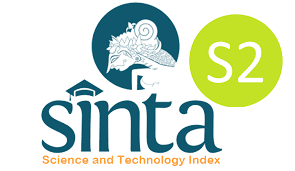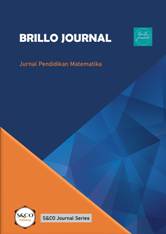Development of Worksheets Based on the Metaphorical Thinking Approach for Students’ Procedural Fluency Ability
DOI:
https://doi.org/10.56773/bj.v2i1.25Keywords:
Metaphorical thinking approach, Procedural fluency, Worksheet developmentAbstract
The mathematics materials in learning mostly used package books, but the provided resources in the school were limited and teachers did not optimize the existing technology to provide effective and interesting materials. As a consequence, students did not complete the exercise according to mathematical procedures and they were pessimistic. The general research purpose was to produce a metaphorical thinking approach-based worksheet for students' procedural fluency on valid characteristics. This study used research and development by the ADDIE stage model. The participant was 9th-grade students in junior high school. Data collection were observation, questionnaires, and interview techniques. The results showed that the characteristics of the developed worksheet have been valid. The results of the worksheet validity test were obtained by 90% and the results of the trial of students were 93%. The implications of this worksheet are helpful for students to independent learning, and this worksheet helps students solve mathematical problems in accordance with procedural, assisted by steps of the metaphorical thinking approach, teaching and learning activities are more effective.
References
Angraini, E., Zubaidah, S., Susanto, H., & Omar, N. (2022). Enhancing creativity in genetics using three teaching strategies-based TPACK model. Eurasia Journal of Mathematics, Science and Technology Education, 18(12), em2196. https://doi.org/10.29333/ejmste/12697
Apertha, F. K. P., Zulkardi, Z., & Yusup, M. (2018). Pengembangan LKPD Berbasis Open-Ended Problem Pada Materi Segiempat Kelas VII. Jurnal Pendidikan Matematika, 12(2), 47–62. https://doi.org/10.22342/jpm.12.2.4318.47-62
Arifin, Z. (2017). Kriteria instrumen dalam suatu penelitian. Jurnal Theorems (the Original Research of Mathematics), 2(1), 28–36. https://doi.org/10.31949/th.v2i1.571
Barlenti, I., Hasan, M., & Mahidin, M. (2017). Pengembangan LKS Berbasis Project Based Learning untuk Meningkatkan Pemahaman Konsep [Development of Project Based Learning-based Worksheet to Improve Conceptual Understanding]. Jurnal Pendidikan Sains Indonesia, 5(1), 81–86.
Çağırgan, D., Karaduman, G. B., & Sönmez, D. (2021). Visual analysis of the classroom teacher candidates’metaphorical perceptions related to the mathematics course. European Journal of Education Studies, 8(4), 76-100. http://dx.doi.org/10.46827/ejes.v8i4.3671
Doyan, A., Susilawati, S., & Hardiyansyah, H. (2021). Development of Natural Science Learning Tools with Guided Inquiry Model Assisted by Real Media to Improve Students' Scientific Creativity and Science Process Skills. Jurnal Penelitian Pendidikan IPA, 7(1), 15-20. http://dx.doi.org/10.29303/jppipa.v7i1.485
Firdaus, H. P. E. (2019). Kelancaran Prosedural Matematis Mahasiswa Dalam Menyelesaikan Masalah Matematika. Konferensi Nasional Penelitian Matematika Dan Pembelajarannya (KNPMP) IV, 1–8. https://publikasiilmiah.ums.ac.id/xmlui/handle/11617/10895
Hasnarika, H. (2022). Penerapan Metaphorical Thinking untuk Meningkatkan Kemampuan Representasi Matematis dan Habits of Mind Siswa SMP. Jurnal Pendidikan MIPA, 12(2), 255–264. https://doi.org/10.37630/jpm.v12i2.586
Huda, I. Z. N., Anggraeni, S., & Supriatno, B. (2020). Analisis Kesesuaian Lembar Kerja Menggunakan Metode Ancor pada Praktikum Plasmolisis pada Sel Tumbuhan [The Comformity Analysis of Worksheets using an Ancor Method in The Practical Work of Plasmolysis Observation in Plant Cells]. BIODIK, 6(4), 550–561. https://doi.org/10.22437/bio.v6i4.9438
Jusmawati, J., Satriawati, S., Akhiruddin, A., Rahman, A., Arsyad, N., & Irman, R. (2021). Developing mathematics learning devices based on creative problem solving model in elementary school. Linguistics and Culture Review, 5(1), 406-421. https://doi.org/10.21744/lingcure.v5n1.1807
Lai, S. Y., Yu, L. G., Hsieh, S. H., Song, M. M., & Chang, T. S. (2019). The development and application of co-design modules for multidisciplinary collaboration and facilitating creativity: An experience from d-school@NTU. International Journal of Information and Education Technology, 9(2), 82–91. https://doi.org/10.18178/ijiet.2019.9.2.1179
Lisnawati, I. (2021). Speaking learning based on multimedia. Journal of Language and Linguistic Studies, 17(4), 2046-2056.
Phuong, H. T. M. (2020). Measuring conceptual understanding, procedural fluency and integrating procedural and conceptual knowledge in mathematical problem solving. International journal of scientific research and management, 8(5), 212-218. https://doi.org/10.18535/ijsrm/v8i05.el02
Pratama, R. A., & Saregar, A. (2019). Pengembangan Lembar Kerja Peserta Didik (LKPD) Berbasis Scaffolding Untuk Melatih Pemahaman Konsep [Development of The Scaffolding-based Student Worksheets to Conceptual Understanding Practice]. Indonesian Journal of Science and Mathematics Education, 2(1), 84–97. https://doi.org/10.24042/ijsme.v2i1.3975
Pratidiana, D., & Muhayatun, N. (2021). Analisis Kelancaran Prosedural Matematis Siswa dalam Menyelesaikan Soal Program Linear [Analysis of Students' Mathematical Procedural Fluency in Solving Linear Programming Questions]. UNION: Jurnal Ilmiah Pendidikan Matematika, 9(2), 189–201. https://doi.org/10.30738/union.v9i2.9369
Rashidov, A. (2020). Development of creative and working with information competences of students in mathematics. European Journal of Research and Reflection in Educational Sciences, 8(3), 10–15.
Retnawati, H., Munadi, S., Arlinwibowo, J., Wulandari, N. F., & Sulistyaningsih, E. (2017). Teachers’ difficulties in implementing thematic teaching and learning in elementary schools. New Educational Review, 48(2), 201–212. https://doi.org/10.15804/tner.2017.48.2.16
Robutti, O., Sabena, C., Krause, C., Soldano, C., & Arzarello, F. (2022). Gestures in Mathematics Thinking and Learning. In Handbook of Cognitive Mathematics (pp. 685-726). Cham: Springer International Publishing. https://doi.org/10.1007/978-3-031-03945-4_8
Setiadi, A., Yuliatmojo, P., & Nurhidayat, D. (2018). Pengembangan aplikasi Android untuk pembelajaran pneumatik [Development of an Android application for pneumatic learning]. Jurnal Pendidikan Vokasional Teknik Elektronika (JVoTE), 1(1), 1–5. https://doi.org/10.21009/jvote.v1i1.6886
Sudana, D. N. (2018). Pelatihan dan Pengembangan Perangkat Pembelajaran Berdasarkan Permendikbud Nomor 22 Tahun 2016 pada Guru-Guru di Gugus V Kediri, Kecamatan Kediri Kabupaten Tabanan [Training and Development of Learning Devices Based on Permendikbud Number 22 of 2016 for Teachers in Cluster V Kediri, Kediri District, Tabanan Regency]. International Journal of Community Service Learning, 2(1), 22–27. https://doi.org/10.23887/ijcsl.v2i1.13680
Sukmana, I., Supriatna, A. R., & Wardhani, P. A. (2022). Pengembangan Bahan Ajar E-Book Berbasis Pendekatan Saintifik Pada Pembelajaran IPA Kelas V Sekolah Dasar [Development of Scientific Approach-Based E-Book Teaching Materials on Science Learning in 5th Grade Elementary School]. Jurnal Pendidikan Tambusai, 6(1), 1275–1281. https://doi.org/10.31004/jptam.v6i1.2597
Syakur, A., Sugirin, S., & Widiarni, W. (2020). The effectiveness of english learning media through google classroom in Higher Education. Britain International of Linguistics Arts and Education (BIoLAE) Journal, 2(1), 475–483. https://doi.org/10.33258/biolae.v2i1.218
Trisiana, A., Sugiaryo, S., & Rispantyo, R. (2019). Implementasi Pendidikan Karakter Dalam Pendidikan Kewarganegaraan Sebagai Inovasi Pengembangan Di Era Media Digital Dan Revolusi Industri 4.0 [Implementation of Character Education in Civic Education as Development Innovation in Digital Media Era and Industrial Revolution 4.0]. Jurnal Global Citizen: Jurnal Ilmiah Kajian Pendidikan Kewarganegaraan, 7(1), 84-98. https://doi.org/10.33061/jgz.v7i1.3059
Yetti, I., & Afriyani, D. (2021). Validasi Lembar Kerja Peserta Didik (LKPD) Berbasis Pendekatan Metaphorical Thinking untuk Kemampuan Pemahaman Matematis Peserta Didik di kelas VIII SMP [Validation of the Metaphorical Thinking Approach-based Worksheets for 8th Grade Students' Mathematical Understanding Ability in Junior High School]. Edusainstika: Jurnal Pembelajaran MIPA, 2(1), 33-38. https://doi.org/10.31958/je.v2i1.3059
Zebua, S., & Waruwu, E. (2022). Students’ Mathematical Procedural Fluency Based on Self-regulated learning. Journal of Innovation and Research in Primary Education, 1(2), 56–62. https://doi.org/10.56916/jirpe.v1i2.179
Downloads
Published
How to Cite
Issue
Section
License
Copyright (c) 2022 Brillo Journal

This work is licensed under a Creative Commons Attribution 4.0 International License.
The authors agree that this article remains permanently open access under the terms of the Creative Commons Attribution 4.0 International License






